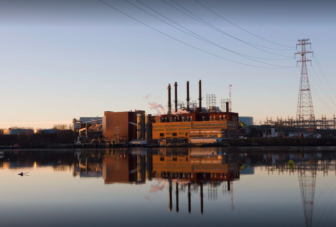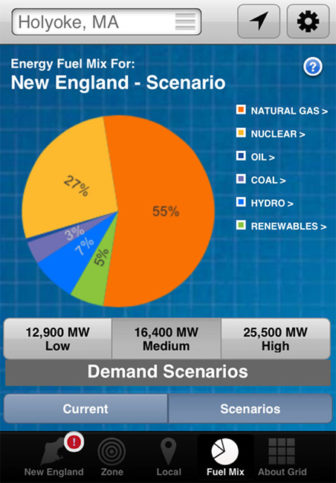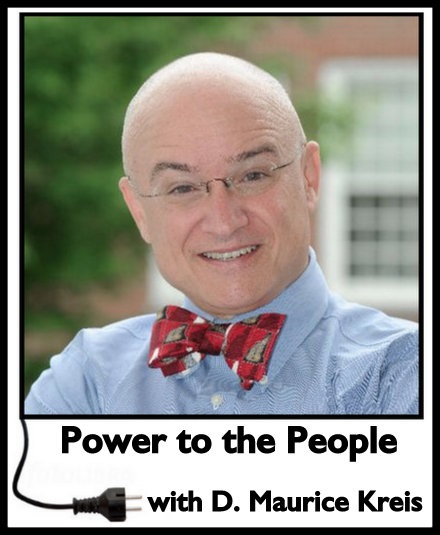Power to the People is co-published by Manchester Ink Link and InDepthNH.org
By D. Maurice Kreis, Power to the People
As dawn broke on one of the first days of 2018, New Hampshire’s statutorily designated advocate for residential ratepayers sat up in bed, noticed that his clock radio has stopped working, and experienced a sensation that fell somewhere between curiosity and panic.

D. Maurice Kreis, NH’s Consumer Advocate
This was no ordinary morning. The temperature outside was well below zero. Wholesale electricity prices, which usually hover in the range of $20 to $40 per megawatt-hour, had been consistently in the three digits for days and had soared beyond $400 at a few points. In our deregulated and restructured electric industry, high prices mean what you’d think they mean: scarcity.

Schiller Station in Portsmouth
Three-quarters of the region’s natural gas generation facilities – normally the bulwark of the regional generation fleet — were not operating , presumably because fuel was hard to come by given the dire and preemptive need of heating customers. Oil-fired generators were chugging away. So was Merrimack Station in Bow and Schiller Station in Portsmouth – New England’s last-remaining coal-fired plants.
The Pilgrim nuclear power plant in Massachusetts had abruptly shut down a few days earlier. That deprived the New England electricity grid, of which New Hampshire is an integral and fully interconnected part, of 688 megawatts of ordinarily available baseload power.
Losing one’s electric power is always annoying. But in this instance the consumer advocate – i.e., yours truly – could not help but wonder whether this was a massive and cascading failure, triggered by one too many plants or transmission lines going off line at the worst possible moment – when no power could literally mean people freezing to death in short order. Or maybe it was just a dead limb falling onto the wires somewhere in the neighborhood, triggering a brief and highly local outage.
Well, there’s an app for that!

ISO to Go
Called “ISO to Go,” the app quickly revealed that the bulk power transmission system was operating within reliability parameters, as it did throughout this first major bout of cold weather in several winters. The app is a service of ISO New England, the nonprofit operator of our region’s grid and wholesale electricity markets. It updates the prevailing prices every five minutes, shows the fuel mix, and reports on any trouble. (Whenever he talks about energy, Governor Sununu enthuses about the app, and rightly so.)
On Twitter, someone referred to the market prices and operating conditions during the cold spell as a Rorschach Test.
To some, the price spikes were evidence of a dire need to build new infrastructure – specifically, new natural gas pipelines with associated schemes to force electricity customers to pay for them.
To others, the news from ISO to Go was a sign that the system is working. They pointed out that as natural gas got too scarce and expensive to burn for electricity, other forms of generation played their designated backup role with great success.
Ratepayers cannot relax however.
Yes, as the cold snap was ending, the Federal Energy Regulatory Commission (FERC) was correctly rejecting the proposal from Energy Secretary Rick Perry to put coal and nuclear plants back into regulated rates, which would have guaranteed them cost recovery, in the name of the latest buzzword: resilience. But the FERC gave ISO New England and its fellow regional transmission organizations just 60 days to report on how they’re addressing this amorphous problem, with further FERC action expected thereafter.

FERC photo
Neil Chatterjee was appointed to the Federal Energy Regulatory Commission by President Trump in May.
One of the five FERC commissioners, Neil Chatterjee, issued a concurring opinion that contained a statement that was both puzzling and troubling. He criticized his colleagues for not agreeing on immediate action and complained that current wholesale market mechanisms are “intended to incent generation resource owners to manage the fuel supply risks they can control — not the spectrum of fuel supply risks beyond their control.”

U.S. Senate Majority Leader Mitch McConnell
Implying that regulators could some provide incentives for generators to manage fuel supply risks they cannot control has a divide-by-zero quality to it that ought to make ratepayers nervous. A useful bit of context is that Chatterjee is a former aide to Senate Majority Leader Mitch McConnell from their shared home state of Kentucky – coal country.
Meantime, ISO New England marked the cold snap by filing a request that the FERC approve its “cash for clunkers” program. The formal name is CASPR – Competitive Auctions with Sponsored Policy Resources. The idea is to build a Rube Goldberg mechanism on top of a Rube Goldberg mechanism.
The underlying mechanism is the ISO New England forward capacity market – basically, paying generators just for promising to be available. It’s supposed to assure reliability but, as we have already noted, we’re past reliability now and into resilience.
A problem with the forward capacity market is that Massachusetts, Connecticut and Rhode Island subsidize the use of renewable generation. (Among other things, this is the impetus for the Northern Pass project to move hydro power across New Hampshire from Quebec.) These subsidies reduce prices in the forward capacity market, supposedly below levels that allow traditional generators – the ones flying the “resilience” banners – to break even.
CASPR would build a second forward capacity market on top of the existing one, so that old “clunkers” could get paid to retire by new generators – which, of course, would get the money from the subsidies paid by southern New England ratepayers. The problem is that the states are divided on CASPR – Vermont, Connecticut and Rhode Island have opposed it – and nobody really knows whether this plan will fix wholesale markets as intended.
Cash for Clunkers arises out of a truly byzantine system of market rules, economic principles, and ISO New England governance. It’s safe to assume that the maddening complexity is itself bad for ratepayers, whose advocates are out-gunned by the big companies whose profits hinge on what rules ISO New England adopts.
So, even though the grid didn’t fail when the temperatures went negative, that sensation from watching electricity markets – the one that falls somewhere between curiosity and panic – well, it’s still there. This is no time to roll over and go back to bed.
 Power to the People is a column by D. Maurice Kreis, New Hampshire’s Consumer Advocate. Kreis and his staff of four represent the interests of residential utility customers before the NH Public Utilities Commission and elsewhere. It is co-published by Manchester Ink Link and InDepthNH.org.
Power to the People is a column by D. Maurice Kreis, New Hampshire’s Consumer Advocate. Kreis and his staff of four represent the interests of residential utility customers before the NH Public Utilities Commission and elsewhere. It is co-published by Manchester Ink Link and InDepthNH.org.





